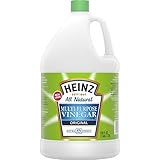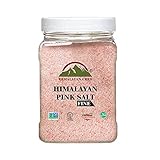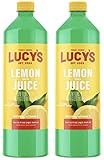For those who struggle with gluten-intolerance or allergy, Celiac disease or who just wish to avoid gluten, food additives can cause extra challenges. Most additives sound more like chemicals than foods, such as potassium sorbate. This raises the question, is potassium sorbate gluten-free?
Yes, potassium sorbate is considered a gluten-free food additive and is safe for those with gluten intolerance, allergy, or conditions such as Celiac disease. Potassium sorbate is a salt that is made from sorbic acid and potassium hydroxide as a food preservative. Other gluten-free alternatives to potassium sorbate include Rosemary Extract, Green Tea Extract, Vinegar, and Celery Powder.
Now that we know potassium sorbate is a gluten-free additive, let’s take a look at what potassium sorbate is and some gluten-free alternatives.
Contents
What is Potassium Sorbate?
Potassium Sorbate is a man-made food additive used as a food preservative as it can inhibit the growth of mold, yeast, and fungi. It is an odorless, flavorless chemical additive derived from sorbic acid and potassium hydroxide.
Common food products that might contain potassium sorbate include baked goods, canned fruits and vegetables, cheeses, dried meats and fruits, ice cream, soft drinks, and yogurt. Potassium sorbate is also found in some personal care items as well as canned pet foods.
Is Potassium Sorbate Healthy?
Potassium Sorbate is on the Generally Recognized as Safe (GRAS) list by the Food and Drug Administration (FDA), meaning it is considered a safe additive when used correctly in foods. To keep it at safe levels, maximum amounts have been created for various foods to avoid overuse.
Some may experience allergic reaction to potassium sorbate in foods. In its pure form, it can be irritating to eyes and skin if exposed. Some are fearful of this additive due to the lack of research on long-term health effects in humans when consumed frequently and further research is still needed.
Because potassium sorbate is a food preservative, it is commonly found in highly processed foods. Although small amounts of potassium sorbate are generally recognized as safe by the FDA, those with concerns should consider incorporating more whole foods in their diet versus processed. Always read food labels to ensure you are aware of the additives in your food.
Nutrition Facts for Potassium Sorbate
Nutrition Facts (Per 100 grams)
- Calories 660
- Fat 0g
- Saturated fat 0g
- Sodium 0mg
- Carbohydrates 100g
- Sugar 0g
- Added sugar 0g
- Fiber 0g
- Protein 0g
Gluten-Free Alternatives to Using Potassium Sorbate
For those looking to take an all-natural approach in your own kitchen or looking to find foods that utilize more natural ingredients, we got you. The additives below are gluten-free, all-natural alternatives to potassium sorbate.
Rosemary Extract
 Consumers are starting to recognize the increased number of artificial additives being used in common food items. With a growing desire to find all-natural products, additives such as rosemary extract have used in place of other common preservatives.
Consumers are starting to recognize the increased number of artificial additives being used in common food items. With a growing desire to find all-natural products, additives such as rosemary extract have used in place of other common preservatives.
Rosemary extract has antioxidants and antimicrobial properties. It has shown to be especially helpful in preventing the oxidation of animal fats in various food products. Rosemary is cheap, readily available and an all-natural herb, making it an excellent additive to replace synthetic ones, such as potassium sorbate, in food products [1].
You can commonly find rosemary extract in food products such as meats, sauces, dressings, baked foods, snack foods, margarine, and some beverages. Because it is an extract, it does not contribute a significant source of nutrients when used as an additive.
Nutrition Facts (Per 1-teaspoon):
- Calories 0
- Fat 0g
- Saturated fat 0g
- Sodium 0mg
- Carbohydrates 0g
- Sugar 0g
- Added sugar 0g
- Fiber 0g
- Protein 0g
Green Tea Extract
 Similar to rosemary extract, green tea extract has been shown to exert antioxidant and antimicrobial activity and has been used in foods as an all-natural preservative. Additives like this can help bridge the gap between reducing synthetic additives and maintaining a low risk of foodborne illness.
Similar to rosemary extract, green tea extract has been shown to exert antioxidant and antimicrobial activity and has been used in foods as an all-natural preservative. Additives like this can help bridge the gap between reducing synthetic additives and maintaining a low risk of foodborne illness.
Just as with drinking green tea, green tea extract benefits are linked with its antioxidant activity, specifically the catechins in green tea such as epigallocatechin gallate (EGCG). This catechin has been studied extensively for its potential benefits on human health and can be found in many herbal supplements [2].
Green tea extract is considered safe. However, some studies have linked high intake of green tea extract to liver disease [3].
Nutrition Facts (Per 1-teaspoon):
- Calories 0
- Fat 0g
- Saturated fat 0g
- Sodium 0mg
- Carbohydrates 0g
- Sugar 0g
- Added sugar 0g
- Fiber 0g
- Protein 0g
Vinegar
 Made from the fermentation of sugar and water, vinegar is highly acidic and works well as a natural preservative in foods. The acetic acid in vinegar can kill and prevent the growth of pathogenic microbes and keep foods from spoiling.
Made from the fermentation of sugar and water, vinegar is highly acidic and works well as a natural preservative in foods. The acetic acid in vinegar can kill and prevent the growth of pathogenic microbes and keep foods from spoiling.
Vinegar’s use dates back 10,000 years ago and is commonly used in pickling fruits and vegetables and in dressings, sauces, and other food condiments. Because of its antimicrobial properties, vinegar is also used in many cleaning products and even in various health treatments such as ear infection and head lice treatment products [4].
Vinegar also contains antioxidant properties which can inflict various health benefits including reducing risk for various chronic diseases. It is readily available in grocery stores, inexpensive and easy to use at home.
Nutrition Facts (Per 1-tablespoon):
- Calories 0
- Fat 0g
- Saturated fat 0g
- Sodium 0mg
- Carbohydrates 0g
- Sugar 0g
- Added sugar 0g
- Fiber 0g
- Protein 0g
Celery Powder
 A powdered form of concentrated celery, celery powder is a common food preservative found in deli meats and other processed or organic meat products in leu of sodium nitrite. Celery powder acts as a naturally occurring nitrate/nitrate.
A powdered form of concentrated celery, celery powder is a common food preservative found in deli meats and other processed or organic meat products in leu of sodium nitrite. Celery powder acts as a naturally occurring nitrate/nitrate.
Nutrition Facts (Per 1-teaspoon):
- Calories 0
- Fat 0g
- Saturated fat 0g
- Sodium 0mg
- Carbohydrates 0g
- Sugar 0g
- Added sugar 0g
- Fiber 0g
- Protein 0g
Garlic
A common pantry staple, many don’t even realize garlic can be used as an effect food preservative, especially in meats. Garlic has antioxidant and antimicrobial properties that we can benefit from by consuming and by using as a preservative in foods. Not to mention, it packs a whole lot of wonderful flavor!
The beauty of garlic is that it does not need to be altered in any way to be effective, such as with rosemary extract or celery powder. Instead, whole garlic can be used and that is the most effective form. It is inexpensive and convenient but because of its strong flavor, it is only suitable for some foods.
Nutrition Facts (Per 1 clove):
- Calories 5
- Fat 0g
- Saturated fat 0g
- Sodium 0mg
- Carbohydrates 1g
- Sugar 0g
- Added sugar 0g
- Fiber 0g
- Protein 0g
Pink Himalayan Sea Salt
 Salt has been used as a natural preservative for centuries and is still used commonly to this day for things like curing meats. Pink Himalayan sea salt contains a higher mineral content and slightly less sodium than regular salt. It also helps to bring out the flavor or what you are preparing.
Salt has been used as a natural preservative for centuries and is still used commonly to this day for things like curing meats. Pink Himalayan sea salt contains a higher mineral content and slightly less sodium than regular salt. It also helps to bring out the flavor or what you are preparing.
Those with elevated blood pressure or who have been instructed by their health care physician to limit salt in their diet, should avoid using this as a common food preserver.
Nutrition Facts (Per 1-teaspoon):
- Calories 0
- Fat 0g
- Saturated fat 0g
- Sodium 0mg
- Carbohydrates 0g
- Sugar 0g
- Added sugar 0g
- Fiber 0g
- Protein 0g
Lemon Juice
 Similar to vinegar, lemon juice contains high amounts of acidic compounds that can inhibit the growth of bacteria and mold. It is also a common, inexpensive, and easy to use all-natural preservative. Though it is similar to vinegar, lemon juice has a strong, tart flavor that is not always conducive for certain foods.
Similar to vinegar, lemon juice contains high amounts of acidic compounds that can inhibit the growth of bacteria and mold. It is also a common, inexpensive, and easy to use all-natural preservative. Though it is similar to vinegar, lemon juice has a strong, tart flavor that is not always conducive for certain foods.
Nutrition Facts (Per 1-teaspoon):
- Calories 0
- Fat 0g
- Saturated fat 0g
- Sodium 0mg
- Carbohydrates 0g
- Sugar 0g
- Added sugar 0g
- Fiber 0g
- Protein 0g
Related Questions
Is Potassium Sorbate Whole30 Compliant?
Yes, potassium sorbate is considered a Whole30 compliant food additive as it is not on the list of additives to avoid. With that being said, it is not encouraged either. It is recommended to limit all food additives within reason and choose more whole foods during the 30-days.
Does Potassium Sorbate Cause Inflammation?
Potassium sorbate is present in some cosmetic and personal care products. Some may experience allergies to potassium sorbate and potassium sorbate by itself can cause eye and skin irritation.
Can Potassium Sorbate Cause Migraines?
Some people may experience food additives as a trigger for migraine headaches. It can be beneficial for those who struggle with frequent migraine headaches to choose foods with limited or no food additives or preservatives to see if it is a trigger.
Does Potassium Sorbate Cause Cancer?
There is concern surrounding chemical additives in food and the relationship to cancer. However, potassium sorbate is ranked low in risk as a potential carcinogen. Further research is still warranted on the true effects of frequent consumption of this additive in food and those who have concerns should limit processed foods in their diet.
